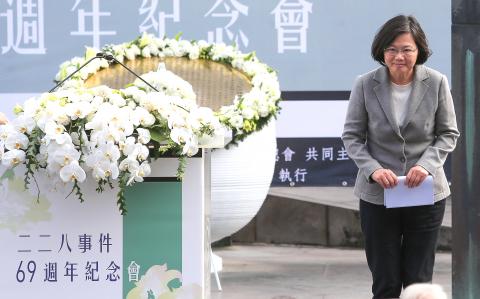President-elect Tsai Ing-wen (蔡英文) yesterday vowed to achieve transitional justice and declassify more official documents regarding the 228 Incident during her presidential term, as she commemorated the 69th anniversary of the 228 Incident.
Tsai made the remarks during a commemorative event marking the Incident at Taipei’s 228 Peace Memorial Park, held by the Taipei City Government, the Taiwan Nation Alliance and the Taiwan 228 Care Association.
The event used music, flowers and food as a way of remembering and paying tribute to victims of the Incident, which refers an uprising that began on Feb. 27, 1947, and was violently suppressed by the ten-KMT government. It led to the White Terror era.

Photo: CNA
While the actual number of people killed and missing remains unknown, some historians have put the figure in the tens of thousands.
“On the same day last year, I was here pledging that, if elected president, I would put an end to history’s mistakes and transform Taiwan into a nation with real freedom and democracy,” Tsai said.
Tsai said she knows people are focused on how the new government plans to push for transitional justice, a goal that, regardless of how difficult it is to fulfill, should not impede the government’s determination to pursue justice, the truth and rapprochement.
The main purpose of transitional justice is to achieve true reconciliation and solidarity within society, Tsai said.
“The willingness to face up to the dark chapters of its history is the basic attitude required of a civilized country. It is also an indispensable process to further and deepen Taiwanese democracy,” Tsai said.
Tsai said pushing for transitional justice would be her most important task because she wants all Taiwanese to face and learn from the nation’s past together so as to avoid repeating the same mistakes.
The president-elect said upon her inauguration, she plans to request concerned government agencies to further study and publish official documents from the White Terror era.
“We welcome people who have relevant documents to share them with us, so that we can have more information to help us excavate the truth,” Tsai said.
In addition to the further de-classification of documents, Tsai said she would also establish a “truth-finding and reconciliation committee” to revise and draw up relevant laws to ensure the restoration of historical facts.
Only with justice and the truth can we put this dark period of history behind us and march forward to the future, Tsai said.
During the yesterday’s event, Pan Hsin-hsing (潘信行), son of 228 Incident victim Pan Mu-chih (潘木枝), said all the families of 228 victims want is the facts, but the Executive Yuan report on the Incident revealed only a partial truth.
“A partial truth is no truth at all. The report only named the victims and left out the perpetrators. What kind of truth is that?” Pan Hsin-hsing said.
He said he hopes that Tsai’s administration can draw from the successful experiences of transitional justice set by South Africa and East Germany.

Taiwan is to commence mass production of the Tien Kung (天弓, “Sky Bow”) III, IV and V missiles by the second quarter of this year if the legislature approves the government’s NT$1.25 trillion (US$39.78 billion) special defense budget, an official said yesterday. Commenting on condition of anonymity, a defense official with knowledge of the matter said that the advanced systems are expected to provide crucial capabilities against ballistic and cruise missiles for the proposed “T-Dome,” an advanced, multi-layered air defense network. The Tien Kung III is an air defense missile with a maximum interception altitude of 35km. The Tien Kung IV and V

The disruption of 941 flights in and out of Taiwan due to China’s large-scale military exercises was no accident, but rather the result of a “quasi-blockade” used to simulate creating the air and sea routes needed for an amphibious landing, a military expert said. The disruptions occurred on Tuesday and lasted about 10 hours as China conducted live-fire drills in the Taiwan Strait. The Civil Aviation Administration (CAA) said the exercises affected 857 international flights and 84 domestic flights, affecting more than 100,000 travelers. Su Tzu-yun (蘇紫雲), a research fellow at the government-sponsored Institute for National Defense and Security Research, said the air

A strong continental cold air mass is to bring pollutants to Taiwan from tomorrow, the Ministry of Environment said today, as it issued an “orange” air quality alert for most of the country. All of Taiwan except for Hualien and Taitung counties is to be under an “orange” air quality alert tomorrow, indicating air quality that is unhealthy for sensitive groups. In China, areas from Shandong to Shanghai have been enveloped in haze since Saturday, the ministry said in a news release. Yesterday, hourly concentrations of PM2.5 in these areas ranged from 65 to 160 micrograms per cubic meter (mg/m³), and pollutants were

Taiwan’s armed forces have established response protocols for a wide range of sudden contingencies, including the “Wan Chun Plan” to protect the head of state, the Ministry of Defense (MND) said today. After US President Donald Trump on Saturday launched a series of airstrikes in Venezuela and kidnapped Venezuelan President Nicolas Maduro, concerns have been raised as to whether China would launch a similar “decapitation strike” on Taiwan. The armed forces regularly coordinate with relevant agencies and practice drills to ensure preparedness for a wide range of scenarios, Vice Minister of National Defense Hsu Szu-chien (徐斯儉) told reporters before a